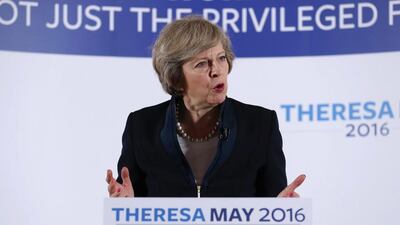LONDON // Theresa May will on Wednesday become the prime minister who leads Britain into talks to quit the European Union, after her last rival to succeed David Cameron pulled out.
Mrs May became the only contender after Andrea Leadsom, who caused outrage when she suggested she was more qualified for the job because she had children, abruptly quit the race on Monday.
Mr Cameron later said Mrs May would take over from him on Wednesday, when he would go to Queen Elizabeth and tender his resignation after a final session of prime minister’s questions in parliament.
“We’ll have a new prime minister in that building behind me by Wednesday evening,” he said outside 10 Downing Street.
Accompanied by her banker husband Philip and surrounded by supportive MPs, a smiling Mrs May later stressed the need “to negotiate the best deal for Britain in leaving the EU” in brief comments outside parliament.
Britain has faced the worst political turmoil in generations following the shock vote on June 23 to leave the European Union.
The outcome prompted Mr Cameron to step down, and plunged his Conservative party into a bitter leadership race.
At the same time, the head of the main opposition Labour party, Jeremy Corbyn, is also facing a challenge to his job.
Senior MP Angela Eagle formally launched her leadership bid on Monday and Labour’s election coordinator, Jon Trickett, said the party should brace for a general election soon after Mrs May takes office.
“It is crucial, given the instability caused by the Brexit vote, that the country has a democratically elected prime minister,” Mr Trickett said.
“I am now putting the whole of the party on a general election footing.”
While Mrs May supported Britain staying in the EU, she cut a low profile during the referendum campaign and insists she will honour the vote.
“Brexit means Brexit,” she said yesterday. “There will be no attempts to remain inside the EU, there will be no attempts to rejoin it by the back door, no second referendum.”
Mrs May wants to begin formal talks to leave the EU by the end of the year at the earliest, despite pressure from Brussels to speed things up.
Jeroen Dijsselbloem, the Dutch finance minister who heads the Euro group of his 19 eurozone counterparts, restated calls for the transfer of power to take place as soon as possible.
“The sooner we can sort out – let me say it diplomatically – this problematic situation, the better,” he said.
The pound, which hit a 31-year low after the Brexit vote, briefly rose after Mrs Leadsom, a pro-Brexit figure with no senior ministerial experience, withdrew from contention to be prime minister.
Mrs May, 59, a clergyman’s daughter, will be Britain’s second female prime minister after Margaret Thatcher, who was in office from 1979 to 1990.
She has portrayed herself as the leader who can unite the country and a tough negotiator who can stand up to Brussels in what promises to be tortuous talks over Britain’s exit from the 28-nation bloc.
Mrs Leadsom’s withdrawal means that all of the ruling Conservative party’s top Brexit campaigners – Boris Johnson, Michael Gove, Mrs Leadsom and UK Independence Party chief Nigel Farage – have now stepped back from leadership roles.
* Agence France-Presse

